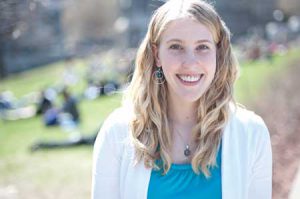
Experiences at McGill, with NGOs, inspire change in career direction
By Jim Hynes
You can study many things in McGill’s various faculties and schools, but journalism isn’t one of them. That said, the next Nellie Bly, or Maureen Dowd to be more current, might just be a McGillian anyway.
Kaitlyn Shannon, an International Development Studies and Political Science student set to graduate this spring, is one of one of this year’s winners of the 2012 EU-Canada Young Journalist Award, an annual competition designed to recognize outstanding journalistic potential among Canadian students.
The Award, created in 2001, selects three students each year to participate in a weeklong study tour of various EU institutions and the Canadian Mission to the EU in Brussels, Belgium. Prior to the trip, the three winners will attend an awards ceremony in Ottawa on May 9, Europe Day. At the event, which will be attended by senior journalists, government officials and the diplomatic corps, H.E. Matthias Brinkmann, the European Union Ambassador to Canada, will present the winners with their awards.
Wrote for NGOs
Although she has no formal journalism training, Shannon has gained writing and reporting experience a number of different ways since she first came to McGill in 2008. The 22-year-old native of Surrey, B.C., has been an active member the University’s chapter of the NGO Journalists for Human Rights, an SSMU club advocating for human rights issues in Canada and abroad through media. In 2010, she interned with Montreal’s Social Justice Committee, another NGO focused on human rights issues, where she wrote for the organization’s Upstream Journal. More recently, Shannon worked as a reporter for the McGill School of Environment, tending to their blog and alumni newsletters and reporting on special events and issues.
“This has been more of a recent development in my life,” Shannon said. “I’ve always been interested in journalism, but until now I’d always looked at it as more of a hobby and something I would do on the side. But now that I’ve done my four years here, and have been pretty involved with other journalism stuff along the way, I realize it is something I want to have as my career.”
In Brussels, Shannon and her fellow winners will attend an EU press briefing, spend time with members of the press corps at various EU institutions, and attend meetings and summits.
“I look at it as more of a learning experience to see what’s it’s like to be press at these institutions and also as an opportunity to make contacts with the big news agencies that are reporting there,” Shannon said.
“I’m not 100 per cent sure what type of journalist I’d like to be, and I think that my experience in Brussels will probably help me sort that out for myself. In the past, most of the journalism work I’ve been doing has been more magazine or journal-type writing, and that’s something that really interests me, working for Maclean’s or the Economist or something like that. Then again, when I found out about this award, it opened my eyes to the potential of being a political journalist, something I would be able to use my degree for, and combining that with a more daily focus might be something I would also consider.”
Inspired by red tape
Shannon won the Award on the strength of her article, Passport to Europe, about the benefits and opportunities for young people holding the passport of an EU country. She got the idea for the story after wading through the red tape of a 2011 exchange she did at France’s Institut des Sciences Politiques (Sciences Po) through McGill’s bilateral exchange program. She spent seven months studying and living in Paris.
“The preparation for going and getting the visas and all the other documentation — it was a nightmare,” she said. “Then I was watching people I knew who had passports from a European country and they didn’t have to do anything. Meanwhile here I was running after documents, trying to get everything sorted. So I started thinking, ‘Do I have any European heritage?’. Unfortunately mine goes too far back, but it got me thinking. Before the EU, people’s options were limited to one country, so it wasn’t necessarily worth pursuing. But now it opens the door to 27 countries. It’s so valuable.”
After she returns from Brussels, Shannon will spend the summer working at Toronto’s Sandra Rotman Centre for Global Health, performing various communications duties on a program researching maternal child and neo-natal health. She hopes to pursue a Master’s degree in journalism sometime in the near future.
This year’s Young Journalist Award winners also include Emily Dickinson of Carleton University and Patricia Vásquez López of Concordia University. To learn more about the Award program visit www.eucanyja.ca/en/
